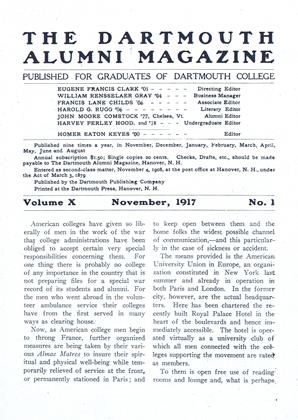Perhaps every Dartmouth man, with the exception of the newcomer to Hanover, has heard and repeated the story of Dartmouth in Civil war time, as told by Rev. J. E. Johnson '66. In those years of the rebellion, Dartmouth was almost deserted, and the few men who continued their campus existence, led a life strangely devoid of the usual undergraduate activity.
But that was in the old days. The Dartmouth of the moment,—the Dartmouth with one hundred and forty-eight years of history already written,—has rather, as a result of the war, become busier than usual. Practically every organization, instead of discontinuing its usual activity, has laid plans for a program equal to, and in some cases, more extensive than its work of the previous year. The enrollment of the College is one-third less than in 1916-1917; yet, except for the absence of actual numbers on the campus, one can see little difference at a surface glance. There is, however, a general seriousness of tone that has seemed to grip the college as a whole, as well as the individual, a seriousness that has never been noticeable before, and a seriousness which, it is believed, will make the year's achievement the most remarkable in the history of Dartmouth.
And this is especially evident in the work of the non-athletic organizations. The chief purpose in the life of every man connected with these undergraduate developing machines seems to be to have his organization continue and thrive in this war year, so its individual story in the after years will be unbroken. Men who previously showed only mediocre capacities in the management of their organizations have been forced into positions of more responsibility, and in their new offices are being given unusual opportunities to develop their latent ability. Sophomores and juniors are doing the executive work formerly left to seniors. It seems to be an ideal working out of the "must-can" theory.
Most of the alumni have probably read or heard already of the great exodus of last spring, how the campus was depopulated by a round six hundred in almost two weeks, how Dartmouth men spoke in terms of Plattsburg, Newport, or France, from the moment their train pulled into peaceful Norwich and Hanover at the end of the spring vacation until they left. But the real question in the minds of the alumni and the undergraduates themselves during the whole summer was as to what would be the reaction to this vital change. Rumor carried broadcast every possibility from the suspension of college, to the establishment of a new curriculum which would be fashioned much after a modern military school.
Among the undergraduates who remained in Hanover last spring it was the common plan to finish out the year and then jump into the war game. But when September rolled around, students who had given Dartmouth a final farewell in June, climbed up the stage coach hill once more to find that many others, like themselves, had postponed their step to enter the service for six months, a year, or more, until they finished that which they had started out to do, to graduate from college. Each train brought more men, and this gradual increase in number of returned upperclassmen helped to influence the man who was in town for a visit and still wavered in his plans.
And this explains why the College could send out shortly after it opened, reports of "More than expected." And it is this very resorting to logical reason, spread college-wide, that has helped to give the College this air of seriousness.
 View Full Issue
View Full Issue
More From This Issue
-
 Article
ArticleA LETTER FROM THE FRONT
November 1917 -
 Article
ArticleTHE NEED FOR UNUSUALNESS IN THE WORK OF THE COLLEGE
November 1917 By Hopkins -
 Article
ArticleAmerican colleges have given so liberally of men
November 1917 -
 Article
ArticleDARTMOUTH WAR RECORD
November 1917 -
 Article
ArticlePLATTSBURG-A TRIUMPH OF EFFICIENCY AND DEMOCRACY
November 1917 -
 Books
BooksArgumentation and Debate
November 1917 By WARREN CHOATE SHAW
Article
-
 Article
ArticleDEPARTMENT CHAIRMEN APPOINTED FOR TERM 1921-1923
November 1921 -
 Article
ArticleAlumni Fund Records: 1915 to 1948
February 1949 -
 Article
ArticleAlumni Council Elections
April 1953 -
 Article
ArticleInvestment Officer
February 1976 -
 Article
ArticleBurma Shaved?
APRIL 1998 -
 Article
ArticleINTELLECTUAL ACTIVITIES
January, 1930 By Albert I. Dickerson

